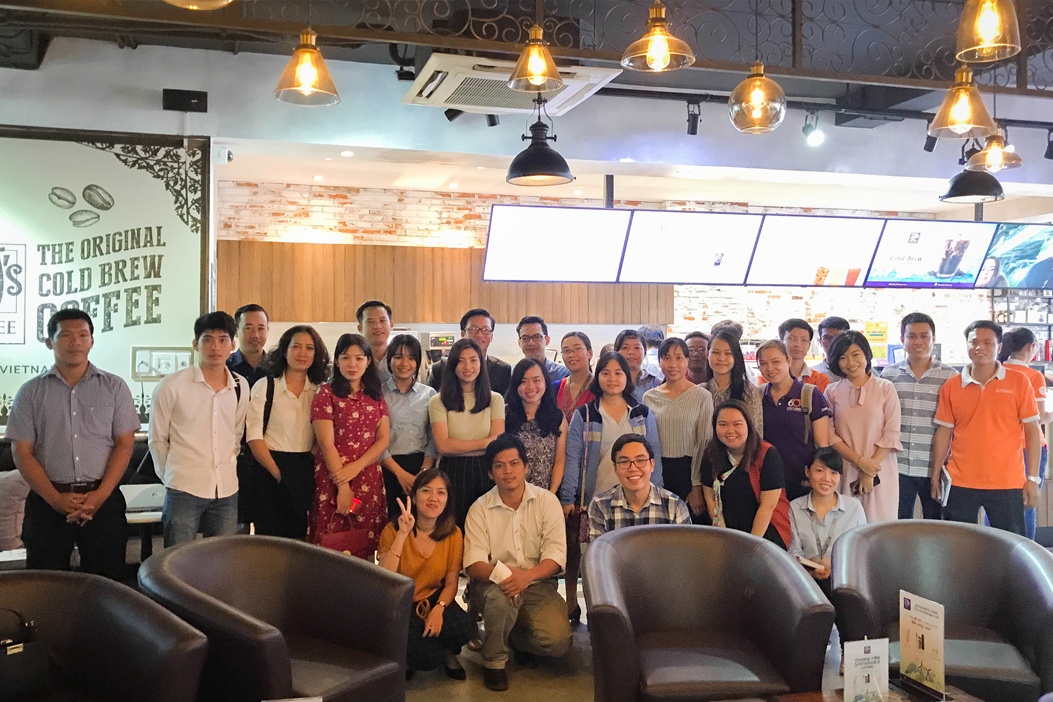On July 25th, the monthly TRG Talk - Talent Management took place at our usual meeting place, PJ Coffee Sala. This month topic was: “Mutual-Learning Approach for Building Productive Team”.
This useful seminar was led by Tran Do Dang Khoa - Business Development Manager, TRG International, had opened many opportunities for participants to get to know more about this skill.
Read more: TRG Talk – Talent Management: Critical Thinking – Achieving Business Goals

What is the mutual learning approach?
Mr. Khoa started the seminar by talking about the five core values which contributed to the Mutual Learning Approach:
- Transparency: Providing relevant information, thoughts, emotions, strategies for the right people, at the right time
- Curiosity: Having an inquiring mind
- Informed choice: Making the best decision based on all that we and the team have
- Accountability: Taking responsibility for your actions, having reasoning your decisions and actions
- Compassion: Considering the circumstances of the opposite person, understanding and willing to help
Unlocking mutual learning behaviours
Achieving these core values relies on particular “mutual-learning behaviours” in order to put the mutual learning mindset into action. Here are seven mutual-learning behaviours:
State your point of view and ask genuine questions
This is what transparent and curious people do: Be honest with yourself and always ask genuine questions. For example: Before the meeting with your team, you need to clearly define: How do you expect your team to perform in a meeting? What is the final result you really want to achieve after the meeting? Do you just want to persuade the others or do you want to understand your team members more?
Share all relevant information
It's very important to create a shared pool of relevant information, so the team can make fully informed decisions.
Explain reasoning and intent
People often make up their own explanatory stories, which can negatively impact the overall efficiency, if things are not stated clearly. That's why we need to explain reasoning and intent to prevent any miscommunication.
Read more: Essential Talent Management Lessons from Top Sport Teams
Focus on interests, not positions
Interests are needs, concerns, and values that motivate each person. Positions are responses or actions a person will take to meet their needs. When preparing for a negotiation, or after it has begun, don't just ask "What do they want?" It is also important to ask, "Why do they want it?" By focusing on interests rather than positions allows people to express the underlying needs and arrive at decisions everyone can commit.
Test assumptions
It's normal for people to just assume. The problem isn't that we make assumptions because it's natural to make it. The problem is that we usually aren't aware that we are making them, so our only choice is to act as if they are true.
When we act as if our assumptions are true (when they’re actually not), that's when we create problems for ourselves and others, including poor decisions, lack of understanding, etc. If people learn to test out their assumption, they will make significant improvements in the results they get and the relationships they build.
Jointly design the next steps
That means deciding with others, not for others, when and how to move forward. When you jointly design the next steps, you are being transparent about your strategy, developing mutual accountability for the process and enabling the group to make an informed choice with you.
Read more: Companies’ Views on Talent Management
Discuss the undiscussable issues
There are a wide variety of ways to successfully discuss the undiscussable issues, but it all starts with seeing everyone as being in cooperative and trying to work together to reach a common goal.
Avoiding discussions of delicate issues will hold back progress, but playful and humorous treatments of tricky issues can help. Sometimes enabling anonymous discussion of the undiscussable using Web-based technologies can tame “the elephant in the room.”
Build mutual learning team
To begin this journey, you need to start with yourself first: Setting personal leadership goals, creating an action plan and telling your team members what you are doing.
The next step is applying this approach to your team by explaining what is mutual learning, why the mutual-learning approach generates better results and discussing the way attitudes predetermine behaviour.
Read more: [Infographic] Why Talent Management Solutions Are Needed
The final step is creating the mutual learning culture. You can also ask an objective third party to help your team members to identify the result.
For more photos of the event, please check out our Facebook page.
About TRG Talk
TRG Talk is a series of events co-organised by TRG International and PJ’s Coffee Vietnam in order to promote the latest trends in the IT industry and the HR world, as well as tips and tricks in improving your project management skills.
About TRG Talk – Talent Management
Is your organisation caught in various problems revolving around talent management? Are you actively looking for ways to efficiently as well as effectively recruit and retain talented staff? TRG Talk - Talent series is a platform where all leaders can openly share their experience in managing talents, how to create and maintain a healthy working environment where everyone of any background, belief, and identity can work harmoniously.
TRG Talk - Talent is held every fourth Wednesday of the month. English
English  Vietnamese
Vietnamese 





